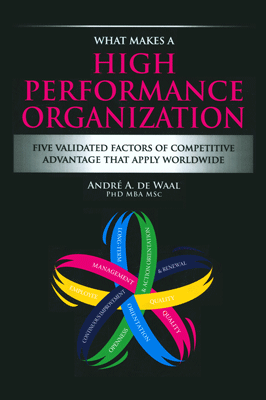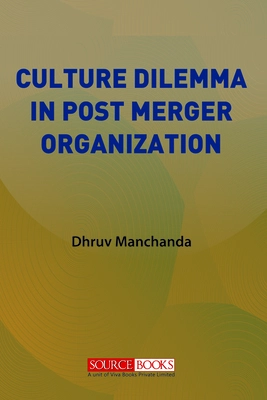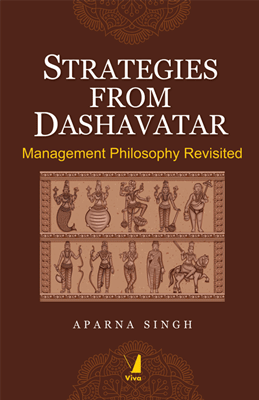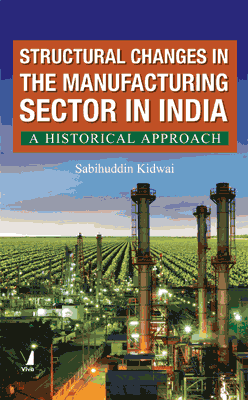
What Makes A High Performance Organization
What Makes A High Performance Organization
Five Validated Factors of Competitive Advantage That Apply Worldwide
₹1,165.50 ₹1,295.00 Save: ₹129.50 (10%)
Go to cart-
Out of Stock
ISBN: 9788130922874
Bind: Hardbound
Year: 2013
Pages: 344
Size: 6 x 9 Inch
Publisher: Viva Books
Published in India by: Viva Books
Exclusive Distributors: Viva Books
Sales Territory: Worldwide
Reviews:
"Finally, a book that goes beyond 'promises' but gives greater clarity about the essential contributing factors of high performance organizations. This pioneering work of Dr. de Waal is a must read for people interested in this subject."
—Manfred F.R. Kets de Vries, Clinical Professor of Leadership and Organizational Change at INSEAD and The Raoul de Vitry d? Avaucourt Chaired Professor of Leadership Development, and one of the world most influential thinkers
"This book sets out to answer one of the eternal questions: what makes a high performance organization? Packed with case examples and valuable insights the book will undoubtedly help you on your journey to becoming an HPO."
—Professor Andy Neely, University of Cambridge
Description:
Because time is short, every manager needs to concentrate on what really matters to achieve outstanding goals efficiently and consistently.
What Makes a High Performance Organization provides the answers as it details the HPO Framework and the five factors managers should focus on to reshape their organization into a high performance organization:
- Management Quality
- Openness & Action Orientation
- Long-Term Orientation
- Continuous Improvement & Renewal
- Employee Quality
The HPO Framework is the result of a global five-year research project into the genuine success factors of High Performance Organizations (HPOs). The HPO Center, led by Dr de Waal, discovered what really works on the ground in every type of organization rather than what managers think should, or might have, worked.
In his book André de Waal gives many real-life examples from a variety of sectors including Finance, Retail, Industry, ICT, High Education and Government, all illustrating the successful workings of the HPO Framework in organizations worldwide. Also included are many interviews with HPO leaders at Microsoft, SABMiller, Svenska Handelsbanken, HP, Tata Steel, Umpqua Bank, Unilever and KLM Royal Dutch Airlines.
Contents:
Chapter 1 Introduction: Starting the journey toward HPO
• Toyota: an HPO in crisis
• Umpqua Bank (USA): a passion for excellence
Chapter 2 Foundations of the HPO: research that spans the world
• The bonus as hygiene factor: the role of reward systems in the HPO
• International bank (the Netherlands): management makes the difference
• Retail International Group (Europe/Asia/South America): learning from the 'best countries'
• Ministry of Local Governance and Social Affairs (Rwanda): working on HPO in government
Chapter 3 HPO factor 1 • Management Quality: without good management there is no HPO
• Longfellow Benefits (USA): even a full-blown HPO can improve
• De Beers Marine (South Africa): dealing with the past through the HPO Framework
Chapter 4 HPO factor 2 • Openness & Action Orientation: less communication, more dialogue
• Vietnamese banking industry (Vietnam): identifying the HPO characteristics of an industry
• Iringa University College (Tanzania): improving through applying the HPO Framework
• Palestine Polytechnics University (Palestine Territories): working on HPO in difficult circumstances
Chapter 5 HPO factor 3 • Long-Term Orientation: stakeholder thinking trumps shareholder management
• The myth of economic growth
• Creating HPO interactions with customers
• The relationship between Corporate Social Responsibility and the HPO Framework
• Two mining multinationals (Peru): using the HPO Framework for corporate social responsibility purposes
• Archway Marketing (USA): flipping the organisational pyramid to become HPO
Chapter 6 HPO factor 4 • Continuous Improvement & Renewal: keep improving ... and be truly innovative
• Amanco Plastigama (Ecuador): emphasising corporate social responsibility as part of HPO
• Two diamond companies (Europe): strengthening the value chain through HPO
• Temping Agency (Europe): looking internally for best ideas
Chapter 7. HPO factor 5 • Employee Quality: without good employees the HPO can never be achieved
• Atrion Networking Corporation (USA): being HPO in inconspicuous surroundings
• South American College of Higher Education (South America): balancing growth with stability
• Nabil Bank (Nepal): achieving the sector's top position
Chapter 8. The HPO transition process: make it happen
• Reasons for starting an HPO Diagnosis
• ATLAS Consortium (UK): creating a successful partnership
• The HPO Framework: guideline for mergers
• Grohe (the Netherlands): achieving success during times of crises
Chapter 9. Benefits of the HPO Framework: it pays to use it
About the author and the HPO Center
Acknowledgments
References
Notes
Index
About the Author:
André de Waal (1960) is Academic Director of the HPO Center, an organization which conducts research into "high performance organizations." In addition, André is Associate Professor High Performance Organizations at the Maastricht School of Management. His teaching assignment is the course Strategic Performance Management and High Performance Organisations. André is also Academic Director of the HPO Center, an organization which conducts research into high performance organizations. He is guest lecturer at the Free University Amsterdam and Erasmus University Rotterdam, and visiting fellow at Cranfield University, United Kingdom. André holds a MSc in Chemistry from Leiden University (the Netherlands), a MBA from Northeastern University Boston (USA) and a Ph.D. in Economics from Vrije Universiteit Amsterdam (the Netherlands). He has been a partner with Arthur Andersen and Holland Consulting Group for 17 years.
As an independent boardroom advisor and researcher, he has advised over 200 global companies on performance management and high performance issues. His consultations with his client companies and professional management associations span five continents with touch points in the USA, UK, Sweden, The Netherlands, Poland, Peru, Ecuador, China, Vietnam, Bangladesh, Mongolia, Nepal, Surinam, Saudi-Arabia, Yemen, South-Africa, Namibia, Rwanda and Tanzania.






